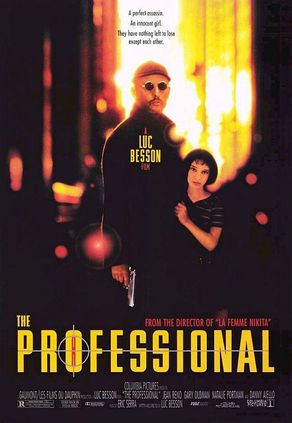
by Liam McMillen
Lately, Luc Besson has gone a bit Robert De Niro on us. Instead of delivering cult classics like The Fifth Element and Nikita, he's churning out tripe like The Family and the Taken franchise. His latest film, Lucy, is said to be a mixture of 2001: A Space Odyssey, Léon and Inception.
Of course, that was said by the man himself, but there's no place in Hollywood for modesty, is there? In celebration of the release of Lucy, I look at Besson's best film, Léon.
Lately, Luc Besson has gone a bit Robert De Niro on us. Instead of delivering cult classics like The Fifth Element and Nikita, he's churning out tripe like The Family and the Taken franchise. His latest film, Lucy, is said to be a mixture of 2001: A Space Odyssey, Léon and Inception.
Of course, that was said by the man himself, but there's no place in Hollywood for modesty, is there? In celebration of the release of Lucy, I look at Besson's best film, Léon.
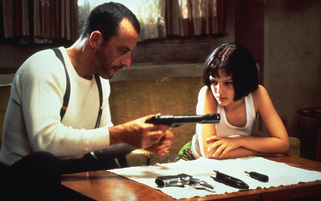
Luc Besson's movie Léon (The Professional) gives us an intense story which sees Jean Reno play a character named Léon who has learned to repress his emotions in order to perform his job as a "cleaner", or hit-man. His secluded world is shattered by a young girl named Mathilda who lives on the same floor as he does in an apartment building. When she turns to him for help, he learns about living a normal life, even if the circumstances which unite them are far from normal.
It obviously helps when your leading man has as much screen presence as Jean Reno. Thin and wiry with toilet brush hair and a face like a bag of spanners, he is hardly your typical gun-toting action hero, but he has an innocence and compassion that makes you fall for him instantly. Leon's life is as simple as a small child's: TV, lashings of milk and the odd gangland assassination. He cannot read, he doesn't sleep, he hasn't the trappings of family or wealth (the fees for his hits are habitually trousered by his `benefactor': sleazy small-time Italian gangster Tony (Danny Aiello)) - In short, he lives like a robot. And then he meets Mathilda.
It obviously helps when your leading man has as much screen presence as Jean Reno. Thin and wiry with toilet brush hair and a face like a bag of spanners, he is hardly your typical gun-toting action hero, but he has an innocence and compassion that makes you fall for him instantly. Leon's life is as simple as a small child's: TV, lashings of milk and the odd gangland assassination. He cannot read, he doesn't sleep, he hasn't the trappings of family or wealth (the fees for his hits are habitually trousered by his `benefactor': sleazy small-time Italian gangster Tony (Danny Aiello)) - In short, he lives like a robot. And then he meets Mathilda.
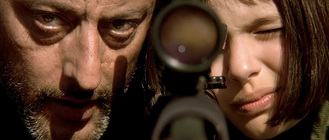
With the odd exception, the rule is usually never to work with kids. They are all doey-eyed, bouffant-haired brats who can cry on cue and are always ready with a cutesy, smart-alec comment that will cause their adult co-stars to tinkle with laughter or tousle their hair playfully. Often they are kidnapped and huge ransoms demanded while their parents go demented with worry. I for one am usually rooting for the kidnappers. But Natalie Portman is the exception.
Natalie Portman's Mathilda is the antithesis of these namby-pamby Dawson's Creek actors-in-waiting. For starters, she has something justifiable to gripe about, in that her entire family has just been slaughtered by Gary Oldman and his gang of crooked DEA officers. This is a bit of a blow, to say the least, but Mathilda takes it all in her stride and teams up with Leon in a bid for revenge. So begins one of the stranger relationships in silver screen history, but one of the most memorable.
On the face of it, a love story between a twelve year old girl and a hairy French hitman would raise a few eyebrows among more conservative movie-goers (and it did), but director Luc Besson handles it so beautifully, it seems like the most natural thing on earth. They are united in being totally alone in the world - indeed, the scene where Mathilda walks quietly down the corridor past the carnage in her apartment and knocks on Leon's door, imploring him in a tearful whisper to let her in is as breathtaking as it is heartbreaking. Leon is wary at first, but she soon wins him round and starts to gently bring him out of the shell.
Natalie Portman's Mathilda is the antithesis of these namby-pamby Dawson's Creek actors-in-waiting. For starters, she has something justifiable to gripe about, in that her entire family has just been slaughtered by Gary Oldman and his gang of crooked DEA officers. This is a bit of a blow, to say the least, but Mathilda takes it all in her stride and teams up with Leon in a bid for revenge. So begins one of the stranger relationships in silver screen history, but one of the most memorable.
On the face of it, a love story between a twelve year old girl and a hairy French hitman would raise a few eyebrows among more conservative movie-goers (and it did), but director Luc Besson handles it so beautifully, it seems like the most natural thing on earth. They are united in being totally alone in the world - indeed, the scene where Mathilda walks quietly down the corridor past the carnage in her apartment and knocks on Leon's door, imploring him in a tearful whisper to let her in is as breathtaking as it is heartbreaking. Leon is wary at first, but she soon wins him round and starts to gently bring him out of the shell.
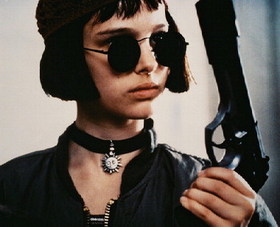
Portman is truly astonishing - one can almost forgive her for being a part of the appalling Star Wars prequels on the strength of this one performance. The iconic image of this tiny, grubby little girl clutching Leon's beloved plant and trotting to keep up with her lanky hero's giant strides is one that will live long in the memory.
Aiello and Oldman (at his sadistic, malevolent best) provide predictably excellent support, there is a wonderfully suspenseful yet satisfying ending - heck, there's even a decent Sting song playing over the credits - for this (if nothing else) it would be remiss of me to give Léon anything other than top marks.
Besson's previous film, Nikita is not one of violence but the idea that people who are full of despair and missing love are not alone. This idea continues in Léon. It was Besson's first foray into international film production. The similarities, or parallels, between Nikita and Léon are undoubted. Both the central protagonists attempt to come to terms with their dysfunctionality, to society, against a background of violence, which they both continue to act upon as the agent of someone else. There is no clean difference (we may also include Le Dernier Combat for comparison.) The only difference is gender.
Aiello and Oldman (at his sadistic, malevolent best) provide predictably excellent support, there is a wonderfully suspenseful yet satisfying ending - heck, there's even a decent Sting song playing over the credits - for this (if nothing else) it would be remiss of me to give Léon anything other than top marks.
Besson's previous film, Nikita is not one of violence but the idea that people who are full of despair and missing love are not alone. This idea continues in Léon. It was Besson's first foray into international film production. The similarities, or parallels, between Nikita and Léon are undoubted. Both the central protagonists attempt to come to terms with their dysfunctionality, to society, against a background of violence, which they both continue to act upon as the agent of someone else. There is no clean difference (we may also include Le Dernier Combat for comparison.) The only difference is gender.
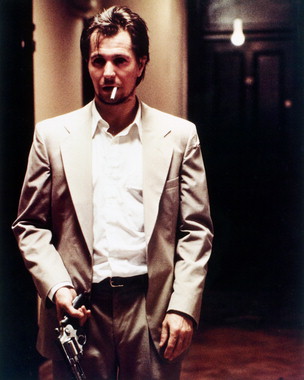
Stylisation and excess are hallmarks of Besson's work. Characters are larger than life. Décors are in excess of realism. Besson's characters lack psychological depth. "The sumptuous and the ornate cohabit with the violent or the vulgar." The use of excess is also extremely playful mixing violence with humour. Besson's work appeals to the tastes of popular culture and may not please that of the elite - arguably a reason for the rejection of his work by many intellectual film journals.
Léon is what movie-making is all about. Without the overuse of special effects, a large shooting location, or a commercially star studded cast, we are given all that could possibly be asked for in a movie. Portman, Oldman, and Reno, along with Danny Aiello as the hit-contractor Tony remind us that there is no substitute for great acting. There are elements of comedy, drama, and action, and great original music by Eric Serra adds to the energy the film already encapsulates. The most impressive thing about the movie is its story which is basic but is maximized by all the other elements which go into the making of the movie. Simply put, it is an intense and impressive movie.
Léon is what movie-making is all about. Without the overuse of special effects, a large shooting location, or a commercially star studded cast, we are given all that could possibly be asked for in a movie. Portman, Oldman, and Reno, along with Danny Aiello as the hit-contractor Tony remind us that there is no substitute for great acting. There are elements of comedy, drama, and action, and great original music by Eric Serra adds to the energy the film already encapsulates. The most impressive thing about the movie is its story which is basic but is maximized by all the other elements which go into the making of the movie. Simply put, it is an intense and impressive movie.
What Do You Think?

What do you think?
Is Leon a Hit Play or a Hit Stop?
Let us know in the comments below!
Is Leon a Hit Play or a Hit Stop?
Let us know in the comments below!

 RSS Feed
RSS Feed
